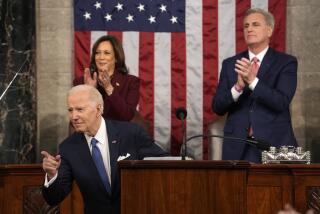Globalization Fosters Me-First Thinking
- Share via
Suddenly, “patriotism” is no longer one of the most ridiculed words in the English language. The countless acts of heroism and compassion since Black Tuesday show vividly that Americans from all walks of life feel part of a genuine national community with profound responsibilities for one another’s safety and well-being.
But if today’s patriotic feelings do not persist and deepen, the willingness to sacrifice could wane amid the frustrations of fighting a shadowy enemy, and the war could be lost.
This national emergency should not be exploited to advance other agendas, but it’s crucial to understand that if the U.S. government continues its 50-year pursuit of trade and globalization policies, that can only weaken today’s patriotic bonds. Congress’ possible vote on fast-track trade negotiating authority is only the latest example. The United States’ decades-long drive to liberalize trade and other economic flows has been sending our citizens a message diametrically opposed to the one they need to hear now. Supporters of current trade policies, for example, scoff at the idea that there is such a thing as the national economic interest, i.e., that if Americans do not hang together economically and act to ensure the most diverse possible industrial base, they will hang separately. Several years ago, Ralph Nader asked the chief executives of many of our leading multinational corporations if they would require the reciting of the Pledge of Allegiance at shareholder meetings. Most who answered declined, muttering that they were global corporations, not U.S. companies.
Supporters of current globalization policies insist that the highest purpose of economic policy should be enabling individual consumers to buy the widest possible range of goods and services at any moment at the lowest possible price, wherever they come from. If unfairly traded imports destroy U.S. industries and weaken the U.S. economy, too bad. That industry and its workers must have been hopelessly noncompetitive and deserved oblivion.
In fact, the economic theories undergirding globalization policies see people simply as autonomous producers and consumers who owe each other nothing. The invisible hand of the market is supposed to create only prosperity and efficiency, not unity or virtue.
In its contemporary guise, global capitalism counsels even harsher treatment of individual workers. Companies are rewarded with higher stock prices for treating workers as so many material assets, to be disposed of as casually as one would toss out a gum wrapper. Newspapers have been filled with ads from businesses victimized by the attacks that likened employee deaths to the loss of family members. But recently many of these same companies also have unhesitatingly laid off thousands of workers. The point is not that the sorrow is insincere or that the layoffs are unjustified. It is that the growing marketization of our entire society rarely encourages Americans to pull together when times get tough.
Nonetheless, Americans have pulled together since the attacks. And the most extraordinary acts of courage generally have come from working-class Americans who have been given little reason in recent decades to feel valued by our economy or our society.
Part of the answer surely reflects the reality that the instinct for self-preservation outweighs any economic grievances, and that Americans understand the self-interested need for unity when national security is endangered. “The greatest generation” rallied after Pearl Harbor, which came at the end of a dozen terrible years for the economy and the working class in particular. And Europe’s downtrodden workers (foolishly, in retrospect) rallied behind their governments at the outset of World War I, to the astonishment of the left.
Maybe in wartime, patriotism can be switched on like a light. It may be that human nature can be much nobler than our often cynical times recognize. Or our post-Sept. 11 record could reflect the fact that the U.S. economy hasn’t been completely globalized, and thus has not felt the full effects.
What we know for sure is that never has the U.S. gone to war after so many years of the economic establishment, the political class and the media positively celebrating our growing divisions, inequality and self-absorption. It’s hardly the best preparation for what is being described as a long struggle.
More to Read
Sign up for Essential California
The most important California stories and recommendations in your inbox every morning.
You may occasionally receive promotional content from the Los Angeles Times.













